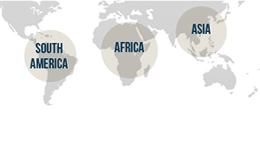Help Us Improve Access to the BCG Vaccine for Travelling Families!
November 27th, 2024 Read More »Japanese Encephalitis Vaccinations for Kokoda and Papua New Guinea
Dr Deborah Mills MBBS MPHTM
Should I have Japanese Encephalitis Vaccination for a Kokoda trip?
The short answer: Probably yes.
The long answer:
You need to discuss this with your travel medicine provider, but here is some information for you to consider.
Japanese Encephalitis is caused by type of virus called a flavivirus. (Other viruses in this family include Dengue, Kunjin, West Nile, Murray Valley Encephalitis.) It is believed that the first flavivirus evolved only about 10,000 years ago and its decendants rapidly colonized the planet.
Not everyone who comes in contact with the JE virus develops an illness, but in those who get symptoms, only about one third will recover, about one third of persons will die, and one third will be left with permanent brain damage. There is no specific treatment.
The first blood-test-confirmed evidence of JE in PNG was in 1989 in the Western Province. An outbreak of JE occurred in the Torres Strait (between Australia and PNG) in 1995. A severe case of JE was acquired near Port Moresby in early 2004. Experts believe the JE virus is now probably widespread in Papua New Guinea. There is very little public health infrastructure or monitoring in PNG so there is no way to confirm how widely the virus is dispersed throughout the country. It may not be obvious if JE cases are occurring in the local population, as victims present with symptoms similar to cerebral malaria, which is known to be rife in PNG.
The JE virus uses pigs as one of its hosts, and there are many pigs farmed in the villages of PNG. There is no evidence for anything that would limit the spread of JE in PNG. In areas of Aisa, where JE has been present for a while, blood test surveys of the population show that 99.5% are positive by age 15.
The Australian Immunisation handbook 9th edition recommends JE Vaccine as follows:
- Travellers spending 1 month or more in rural areas of Asia, however, as JE has occurred in travellers after shorter periods of travel, JE vaccination should be considered for shorter-term travellers, particularly if the travel is during the wet season, and/ or there is considerable outdoor activity, and/or the accommodation is not mosquito-proof.
- For all other travellers spending a year or more in Asia (except Singapore), even if much of the stay is in urban areas
- Travellers intending to spend a month or more in Papua New Guinea, particularly if the travel is during the wet season.
Since Kokoda trekkers do undertake ‘considerable outdoor activity’ it would seem prudent to protect oneself, even though so far, no kokoda trekkers have been diagnosed with JE.
Up until recently we did not have a very good vaccine for JE. The vaccine we had was reasonably effective, but there were problems with side effects. This older Biken vaccine used old vaccine technology, e.g. it was made using mouse brain to grow the virus. Persons often developed more than just a sore arm, about 10% developed effects away from the vaccine site e.g. fever, rash, headaches, muscle aches, abdominal pain.
There is now a one dose vaccine that gives lifetime protection, and has a low incidence of side effects: it is not just iphones that are improving, vaccine technology is getting better all the time.
Once again it is important to discuss this and other health precautions with your specially trained travel medicine provider.
Mpox and risk to Travellers
August 22nd, 2024 Read More »
Understanding Japanese Encephalitis: A Travel Health Advisory
June 10th, 2024 Read More »



